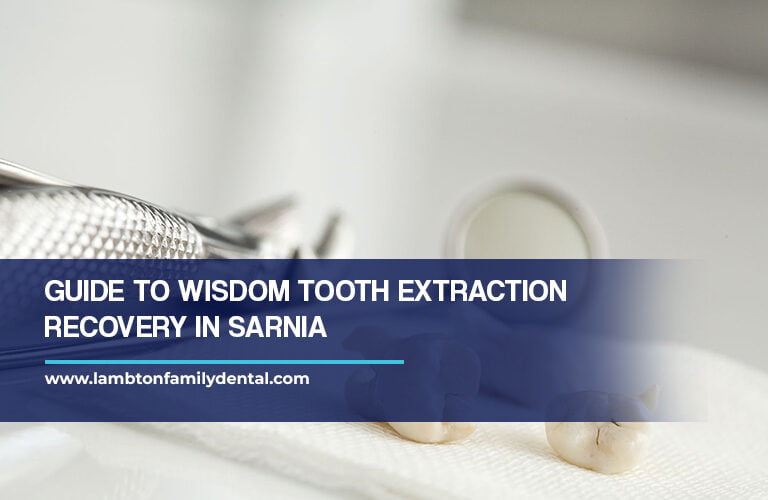Although called “wisdom teeth,” they don’t make you smarter. When they come in late, they can hurt a lot and push against your other teeth. Sometimes they cause problems with your jaw, sinuses, cavities, and cysts. In Canada, more than 7 million people have impacted third molars, who potentially require extraction surgeries.
A dentist in Sarnia may recommend a wisdom tooth extraction if necessary. The Canadian Association of Oral and Maxillofacial Surgeons recommends removing wisdom teeth when you’re younger, usually between 15 to 22 years old, is safer, easier, and requires less time to recover compared to removing them later in life.
When a Wisdom Tooth Extraction Necessary

Typically, wisdom teeth must be taken out as they impact the other teeth. This occurs when they lack room to grow due to the presence of other teeth. Consequently, they may sprout at different angles in the jaw, including horizontally.
Other issues that often arise with the growth of wisdom teeth include:
- Damage to the Jaw – Cysts can grow near new teeth. If not treated, they can make holes in your jaw and damage nerves.
- Teeth Damage – Additional set of molars can move your other teeth, leading to mouth discomfort and difficulty biting.
- Inflamed Gums – Wisdom teeth can cause the tissues nearby to swell, which can be hard to clean
- Sinus Problems – Wisdom teeth issues may cause discomfort in the sinuses, resulting in pain, pressure, and congestion.
- Cavities – Inflamed gums can create small pockets between teeth where bacteria can thrive and lead to tooth decay.
- Alignment – When wisdom teeth are stuck, they can crowd other teeth and might even require treatment to straighten them out.
What to Expect After a Wisdom Tooth Extraction in Sarnia
Immediate Post-Operative Period (Day 1-2)
After undergoing wisdom tooth extraction, it’s common to experience pain, swelling, and bleeding in the first couple of days. This serves as a testament to the invasive nature of the procedure and the body’s natural response to it. To alleviate discomfort during this time, consider the following tips:
- Apply gauze to the extraction site to control bleeding.
- Use ice packs intermittently to reduce swelling and numb the area.
- Take prescribed or over-the-counter pain medication as directed to manage discomfort.
- Rest and avoid strenuous activities to promote healing.
Subsequent Days (Day 3-7)
As the days progress, you may notice a reduction in pain and swelling. However, it’s essential to continue practicing proper post-operative care to facilitate optimal healing. Beyond just managing symptoms, focus on:
- Maintain good oral hygiene by gently brushing and rinsing with salt water or a prescribed mouthwash.
- Consume soft foods like soups, yogurts, and mashed vegetables to avoid irritating the extraction site.
- Avoid smoking or using straws, as these activities can dislodge blood clots and delay healing.
Post-Operative Care Tips

Extracting impacted teeth requires a serious surgical process. Post-operative care can help you speed up your recovery and minimize the risk of complications, such as infections and swelling.
- Bleeding
It’s normal to have some bleeding after surgery. You might notice a bit of bleeding, oozing, or redness in your spit. If you experience bleeding, you can try rinsing or wiping away any old clots from your mouth first. Put a piece of gauze over the area and bite down on it firmly for thirty minutes. You can repeat this if needed. If the bleeding keeps going, try biting down on a wet tea bag for thirty minutes. The tannic acid in the tea bag can help stop the bleeding by making the blood vessels shrink. To help prevent more bleeding, stay calm, sit up straight, and avoid moving around too much. If the bleeding doesn’t stop, call for more instructions.
- Pain and Discomfort
Most mouth surgeries cause some discomfort. To ease pain, start with common pain relievers like Tylenol® or Advil®. Only take these if your surgeon says it’s okay. Take the first pill before the anesthesia wears off. Eat a little before each pill to avoid feeling sick.Everyone responds differently to pain meds. For strong pain, your surgeon might prescribe a narcotic like Vicodin®. Follow the dosage instructions carefully. Don’t take more than prescribed. If you still feel pain and discomfort, you can switch between Vicodin and ibuprofen during the day. If you’re still uncomfortable, contact us for help. Don’t drive or drink while on pain meds, and don’t mix them with certain other medications. If you’re unsure, ask your surgeon or pharmacist.
- Swelling
Swelling is normal after surgery, and it usually starts showing up 1-2 days later, reaching its peak in 2-3 days. You can reduce swelling by using ice packs right away and keeping them on as much as possible while you’re awake. After 48 hours, ice won’t help much. It’s normal to still have some swelling or stiffness in your jaw a few days after surgery. Applying gentle heat to your face after 36 hours can help. Try sleeping with your head raised on two pillows for 2-3 nights after surgery.
- Infection
Remember to follow the instructions for your antibiotics. If you notice any unusual swelling or discharge, it could be a sign of infection. Keep in mind that your healing wound may look whitish-grey. It’s normal to have a slightly higher temperature right after surgery, especially within the first day, but it doesn’t always mean you have an infection.Don’t forget to brush your teeth. Keeping them clean helps reduce the risk of infection. Use a toothbrush softened with warm water, and be gentle when brushing around the teeth near where your tooth was removed. It’s normal to experience some bleeding while brushing.
- Diet
After surgery, start by drinking liquids. As you feel better, add more food. Avoid using a straw as it can make bleeding worse. Eat soft foods and avoid extreme temperatures. Eat foods high in calories and protein regularly to stay nourished. Drink juice or sports drinks often to avoid dehydration. You might eat less solid food at first, so drink more fluids. Aim for 6-8 glasses of liquid each day and don’t skip meals. Eating and drinking regularly helps you heal faster.
Recovering from wisdom tooth extraction requires proper care and access to local resources. By following the tips in this guide, you can make your recovery smoother.
If you need a wisdom tooth extraction in Sarnia, Lambton Family Dental is here to help. Contact us today at (519) 344-5747 to schedule your appointment and take the first step towards a healthier smile.

